
‘An across-the-board chaos’
An interview with Sakib Sherani former member of the PM’s Economic Advisory Council
Karachi: The government’s incompetency and unwillingness to recognise the gravity of the economic situation of Pakistan and stalling the negotiations with the International Monetary Fund (IMF) for around five months, resulted in an across-the-board chaos, said Sakib Sherani, a leading economist and former member of the prime minister’s Economic Advisory Council.
The situation will get worse if the government further delays the resumption of the IMF programme, he added.
Talking to BOL News, Sherani said that Pakistan’s economy is in a difficult situation, as the country is skirting towards a potential external default. In immediate terms, the foreign exchange reserves of the country have declined below $3 billion, which could roughly cover around two weeks of imports, he remarked.
Due to the narrowing foreign exchange reserves, the rupee came under severe pressure and witnessed a steep depreciation to now trading at around Rs270/dollar. Besides, the government raised the electricity and gas tariffs to meet the IMF conditions, which in addition to the deteriorating exchange rate, resulted in making everything expensive for the people.
Following are the excerpts of an exclusive talk with him:
Q. What will be the impact of the rising inflation on common people?
Sakib Sherani: The inflation is at unprecedented levels in Pakistan due to the increased prices of utilities and the rupee depreciation. The common people have been impacted by this significantly.
If we look at the official inflation, it has been massively increased and underreported since April 2022, as in actual terms, it is roughly half of the actual inflation the people are experiencing.
Since April 2022, the purchasing power of the average Pakistani has declined 33 per cent. The ability to purchase has gone down by one-third in only 10 months, which has never been witnessed in the history of the country.
The estimates by various economists showed that around two million Pakistanis have lost their jobs during the last 10 months. The citizens are not just feeling the brunt of inflation but also that of unemployment.
Q. What are the reasons for the collapse of the economy?
SS: The balance of payments crisis was gradually developing a year ago, when the international commodities’ prices had skyrocketed during the second half of 2021. Pakistan was paying a substantial amount of money for the import of petroleum products and the liquefied natural gas (LNG), which resulted in a depletion in our foreign exchange reserves and rising inflation.
However, the Russia-Ukraine conflict actually tipped the scale of the overall situation, as the global economies experienced hiked commodities’ prices and supply disruption. On the local front, Pakistan went through a regime change operation, which resulted in political instability, while the lack of competent handling by the new government made things even worse for Pakistan.
Q. Is economic stability possible in the current political situation?
SS: I think it is going to be difficult to bring economic stability in the current political conditions.
The way the establishment seemed to be approaching this situation is by removing the Pakistan Tehreek-e-Insaf (PTI) from the equation, which may have helped them in the short-term. However, it is not an actual solution to the political crisis of the country.
Q. What is needed for economic stability? Fresh elections or charter of economy?
SS: The Charter of Economy is not going to help because we have had these documents in the past, as well. Not everyone can agree on what needs to be done, while the agreement between all the stakeholders can be a difficult thing to achieve.
All the political parties agree on stabilising the economy, despite having different approaches to do it. However, the way the establishment operates, actually hurts the economy, in terms of changing governments, not respecting the mandate of the elected governments.
Fresh and free and fair elections and then to respect the mandate of the elected government is the key to bring economic stability in Pakistan.
Q. How can Pakistan get back to economic stability?
SS: The first thing is to bring political stability by electing a government through fresh elections. The establishment withdraws to the sidelines and provides the needed support to the government, while not interfering in the government business. There is a need to hold a range of reforms, including structural and institutional reforms, such as fixing the taxation system, exports and reforming the civil service. The PTI government had worked on these reforms and was on the verge of implementing them before the regime change took place.
Q. Is the current government incompetent or unwilling to put the country back on track?
SS: Although the government is now taking measures to bring some stability to the economy, it has delayed implementing such policies for around five months, which makes things much worse. It is partly incompetence on the government’s part and largely because they [the government] did not want to have a negative impact on their party politics, so they put their political interests before the national interests.
Q. What are the differences between the PDM and the PTI governments’ policy?
SS: I think it is an unfair question to compare the two governments, as the PTI had encountered different situations when it was at the helm of affairs for three-and-a-half years. However, the PTI government did manage to stabilise the economy on a fast track basis. The PTI government faced and handled two back-to-back crises in a very good manner, showing that its crisis management was far superior among the two governments.
They inherited the balance of payments crisis, which this government has also inherited from the PTI government. However, the previous government handled it very quickly. Additionally, the PTI government faced a once in a lifetime pandemic right after stabilising the economy. It handled that situation very well also, as Pakistan’s economy was not scared the way many other economies were impacted, including those of the neighbouring countries.
Q. Why does the government fail to attract FDI inflows from friendly countries?
SS: Friendly countries’ approach has changed, as they have communicated very clearly, especially to the coalition government that they will only help Pakistan once it secures an IMF deal.
The continuous delays in the resumption of the IMF programme is the only reason that the foreign direct investment (FDI) and investment from Pakistan’ friendly countries is not coming.
Catch all the National Nerve News, Breaking News Event and Latest News Updates on The BOL News
Download The BOL News App to get the Daily News Update & Live News.












 Read the complete story text.
Read the complete story text. Listen to audio of the story.
Listen to audio of the story.